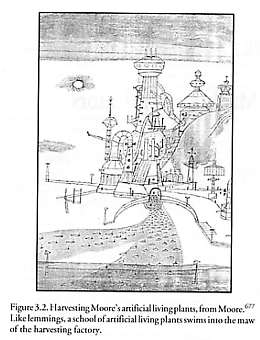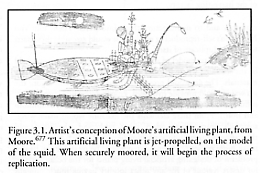Ever seen that PBS Space Time video about Von Neumann Probes? It’s a cool video. The idea of self replicating robots colonizing the galaxy is cool, but the coolest thing in the video is a passing reference to a proposal by Edward F. Moore:
…desert or ocean-dwelling self-replicators who’s only purpose was to build copies of themselves, which humans would then harvest for parts…


I was reminded of this idea reading a post by George Hotz. George talks about machines that can fight entropy, like life. Technology that, left alone, “…after 5 years it has built a paradise.”
Creating a machine ecology not only means that said machines are more robust than what we have now, it also means that technology can be made a part of nature instead of industry. This hints at a path to a technological society that is not an industrial one (which may be the positive rebuttal to The Unabomber Manifesto Hotz searches for). But there is a third interesting possibility that I see in the machine ecology: to align technology with primal humanity.
Enter the Mekhosphere
Moore’s artificial plants, Von Neumann probes and other self-replicators are certainly good pictures of what technology that can persist with in the absence of humans should look like, but what about in the presence of humans? Such advanced, self-sufficient machines could surely leave most if not all of our needs satisfied. Fully automated farming, city construction, water purification, security, manufacturing etc. is a hot topic given the world’s current state of AI hype, and most people respond by either becoming neo-luddites, accepting the singularity (or even going full accelerationist like Nick Land) or suggesting various social welfare systems like UBI to cope with the social upheaval that is likely to arise from everything being done by machines.
Since the genie is already out of the bottle, there’s really no hope for neo-luddites, and to say I’m sceptical of the good that more welfare would do for the average western society would be a euphemism. But, I also happen to feel slightly uncomfortable with the various brands of transhumanism that I’m left to choose between—this is indeed quite the pickle.
Luckily, I feel I’ve stumbled on a fourth path: The Mekhosphere, our biosphere’s machine-based sister.
In the previously referenced ideas for robot ecologies, individual machines are usually collectively directed toward a specific goal, and only interact in so far as they may cooperate in order to achieve the goal. Said goal is whatever the humans who created the robots created them to do: harvest natural materials to build more of themselves, purify water or fertilize soil, construct factories, space elevators, highways, communications networks etc. There was a workshop about these sorts of ideas that ran from 2002-2004, organized by a NASA/Ames Research Center computer scientist, called Robosphere Self-Sustaining Robotic Ecologies. Despite the similar name, however, a Robosphere is not a Mekhosphere.
What distinguishes the two is that machines in the mekhosphere are not designed as means to an end and as a result do not necessarily cooperate. They are not mere swarms of robots made to turn mercury into a Dyson Sphere, or build factories on the Moon (although both are extremely cool). They are not tools, nor anything else that would make them so closely intertwined with mankind. They are supposed to be living beings, members of yet another sphere of the ecosystem we inhabit. Some are peaceful, and would be make good friends, others are hostile and must be fought off. Both contain within their bodies powerful technology that can be harnessed. Think Horizon Zero Dawn done on purpose, or as a friend of mine described it “Cyber-Neolithic” (or Paleolithic depending on your view of the agricultural revolution).

There’s no need to play God… just let go
Shifting technology away from industry in this way seems to me like a good
alternative. In a way, it can be thought of as technological secession. We
give up the right to control technology, and the responsibility associated with
it, handing it over to creation itself.
The influence machines exert over us is accordingly diminished to sane levels.
Instead of needing to augment and artificially improve ourselves to keep up
with and continue to direct its development, we make technology a truly
autonomous feature of our environment, and allow mankind to co-evolve with it in
a relationship more similar to our primordial relationship with other living beings.
As Uncle Ted points out, living in our current high-tech society predominantly involves surrogate activities of the increasingly mental kind, often at the expense of our real needs. Human beings hunt, forage, farm, trap, play, fight and flee. Our minds and our hearts are birthed from what we do with our bodies, which we ignore at our peril. Adding a sphere of machines to the stage of human life might be a way to shift emphasis back to the body and real external goals, to experience and interact with technology in a more primal way.
In a future article I want to go into more detail on what a mekhosphere could look like, but for now I’ll leave you with this.
Imagine a world where we spear fish for metal octopi deep in the ocean, harvesting their components to build a submarine. Where we raise robotic camels in the desert, to build high efficiency cooling systems and devices that can harness water from air. Where we valiantly fight off predators, both animal and machine, to protect our kin.